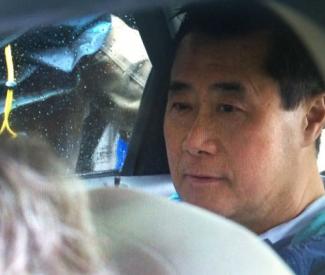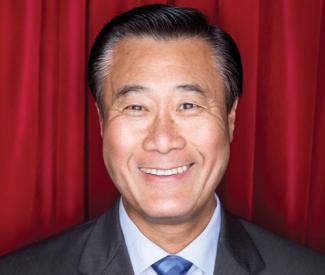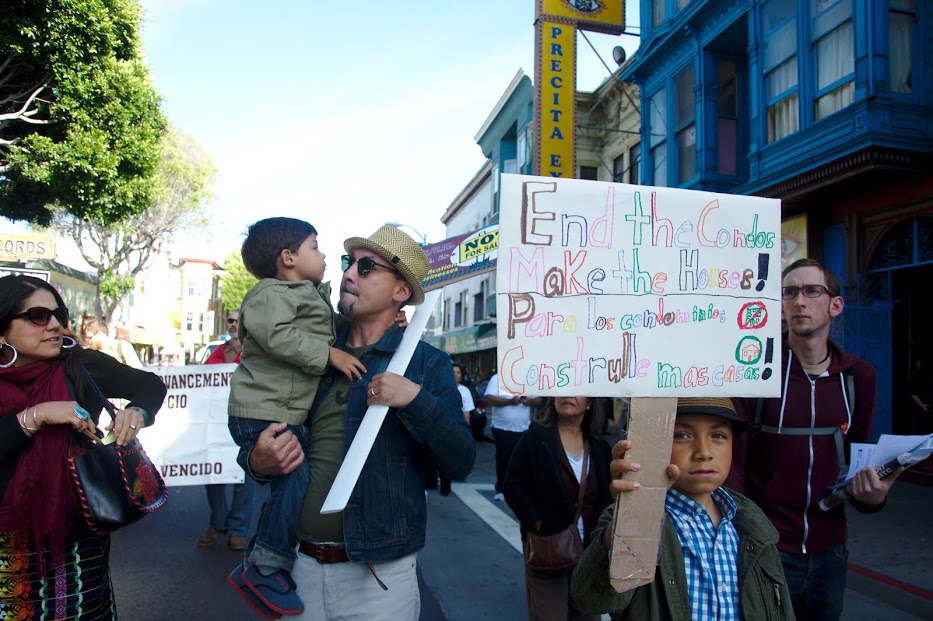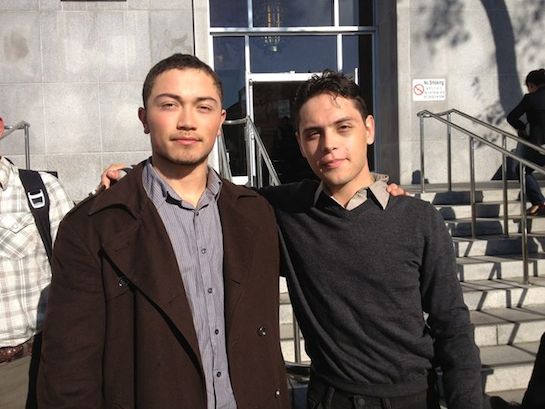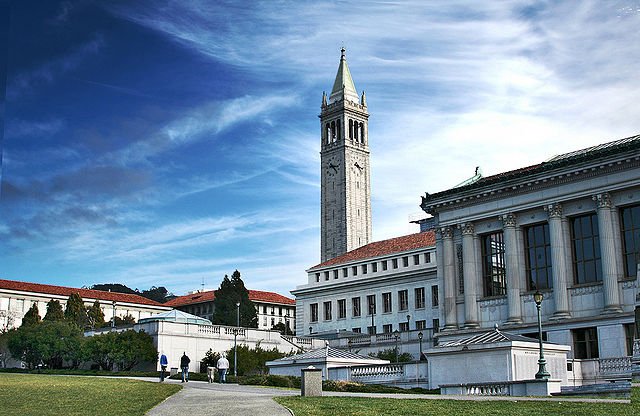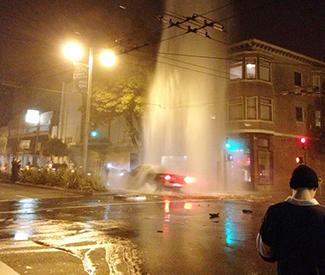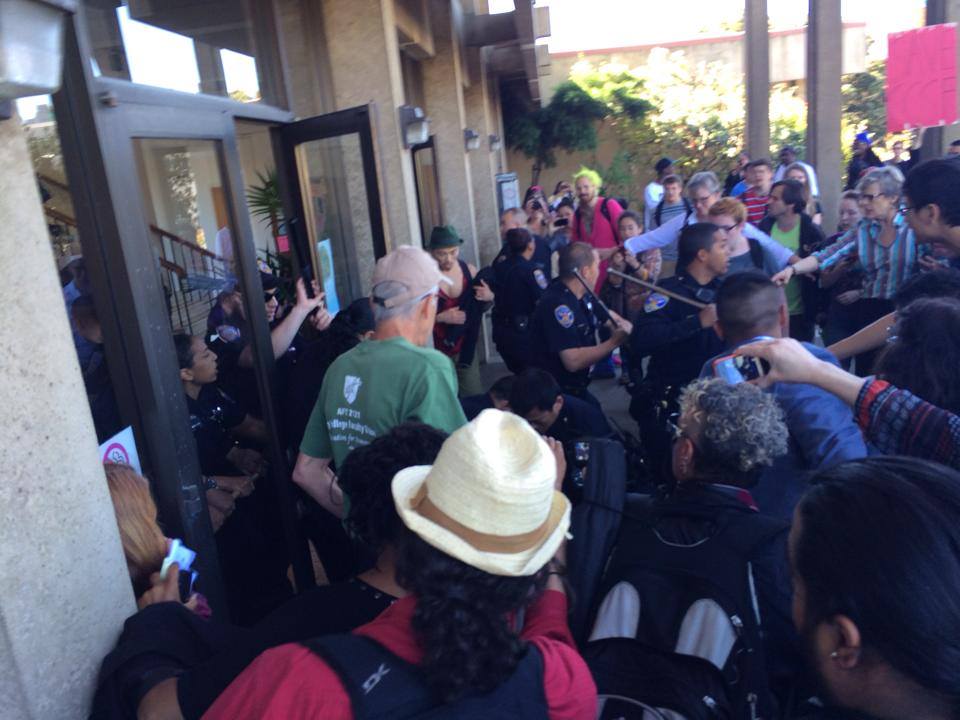The federal criminal charges filed today against Sen. Leland Yee (D-SF), local political consultant Keith Jackson, reputed Chinatown organized crime boss Raymond “Shrimp Boy” Chow, and 23 other defendants allege a vast criminal conspiracy that was penetrated by undercover FBI agents, who say they then gave Yee envelopes full of cash in exchange for official favors.
Among the many bizarre aspects of this blockbuster case, Yee stands accused of taking part in a conspiracy to illegally smuggle firearms into the country, and using those deals to help secure campaign contributions for his current campaign for Secretary of State, while he was sponsoring a trio of gun control bills that were signed into law last year.
Yee, who reportedly faces 16 years in prison for two felony counts of wire fraud and conspiracy to deal firearms without a license and to illegally import firearms, was arrested this morning during a series of early morning police raids, pleaded not guilty at his arraignment this afternoon, and was freed after posting a $500,000 unsecured bond.
Chow had a long criminal history as the admitted head of the Hop Sing gang in SF’s Chinatown, serving prison time. “Chow’s criminal history includes a guilty plea in federal court for racketeering, involving murder for hire, conspiracy to distribute heroin, arson, and conspiracy to collect extensions of credit,” the complaint notes. (You can read the full complaint here.)
Chow publicly claimed to go legit after being released from federal prison in 2006, and he has cultivated many high-profile business and political connections in San Francisco. But the 137-page criminal complaint that was unsealed today alleges that “Chow is currently the Dragonhead, or leader, of the San Francisco-based Chee Kung Tong organization,” which it describerd as a criminal syndicate connected to Hung Mun, a criminal dynasty that began in 17th century China, “also referred to as a Chinese secret society and the Chinese Freemasons.”
It says Chow was sworn in as CKT head in August 2006 after being released from federal prison, soon after the still-unsolved murder of CKT head Allen Ngai Leung. Chow’s swearing-in was reported in local Chinese media sources, so SFPD and FBI conducted surveillance there and launched an investigation.
CKT is allegedly part of Triad, an international Chinese organized crime group with ties to China and Hong Kong, and in San Francisco it is said to be comprised of Chow’s Hop Sing, a street gang with 200-300 members, and the Wah Ching gang headed by George Nieh, who was charged with a variety of crimes today.
“Nieh said he was in charge of the Wah Ching gang and Chow was in charge of the Hop Sing gang. Nieh said they used to be enemies, but banded together instead,” the complaint says, relating what they allegedly told FBI informants who had infiltrated the organization.
The FBI says it began infiltrating CKT five years ago, including an undercover FBI agent dubbed UCE 4599, who in May 2010 was introduced to Chow, who “then introduced UCE 4599 to many of the target subjects.”
Chow allegedly told UCE 4599 that he oversees all of CKT criminal enterprises, but doesn’t actively run them anymore, acting as a arbiter, or as a judge when one CKT member kills another. Nieh allegedly heads the criminal activities division and reports to Chow.
They are accused of laundering money made from “illegal activities, specifically illegal gambling, bookmaking, sports betting, drugs, and outdoor marijuana grows.” They allegedly laundered $2.3 million between March 2011 and December 2013 for UCE 4599, with members collecting a 10 percent fee for doing so.
UCE 4599 told Chow he was a member of La Cosa Nostra, an Italian mob, and in March 2012 he was inducted into CKT as a “Consultant,” the complaint alleges. It says that Jackson — a former San Francisco school board member and political consultant who has worked for Lennar Urban and Singer Associates — had also be inducted into CKT as a “Consultant,” participating in various criminal conspiracies.
The complaint says Jackson “has a long-time relationship with Senator Yee,” and “has been involved in raising funds for” Yee’s run for mayor “and for Senator Yee’s current campaign in the California Secretary of State election.” And much of the complaint details deeds allegedly committed by Jackson and Yee.
In fact, the second person named in the complaint, right after Chow, is Yee, “aka California State Senator Leland Yee, aka Uncle Leland.”
“Senator Yee and Keith Jackson were involved in a scheme to defraud the citizens of California of their rights to honest services, and Senator Yee, [Daly City resident Dr. Wilson] Lim, and Keith Jackson were involved in a conspiracy to traffic firearms,” the complaint alleges.
Yee and Jackson met UCE 4599 through Chow, and then Jackson allegedly solicited him to make donations to Yee’s 2011 San Francisco mayoral campaign “in excess of the $500 individual donation limit. UCE 4599 declined to make any donations to Senator Yee, but introduced Keith Jackson and Senator Yee to a purported business associate, UCE 4773, another undercover FBI agent,” who made a $5,000 donation to Yee’s mayoral campaign.
Yee had $70,000 in debt after that mayor’s race and worked with Jackson on ways to pay off that debt. “This included soliciting UCE 4773 for additional donations and in the course of doing so, Senator Yee and Keith Jackson agreed that Senator Yee would perform certain official acts in exchange for donations from UCE 4773.”
Yee allegedly agreed to “make a telephone call to a manager with the California Department of Public Health in support of a contract under consideration with UCE 4773’s purported client, and would provide an official letter of support for the client, in exchange for a $10,000 donation. Senator Yee made the call on October 18, 2012 and provided the letter on or about January 13, 2013,” and Jackson allegedly took the cash donation from the agent.
Meanwhile, it says Jackson and Yee continued raising money for his Secretary of State race by soliciting donations from UCE 4599 and UCE 4180, another undercover agent. “They agreed that in exchange for donations from UCE 4599 and UCE 4180, Senator Yee would perform certain officials acts requested by UCE 4599 and UCE 4180.”
That included Yee issuing an “official state Senate proclamation honoring the CKT in exchange for a $6,800 campaign donation, the maximum individual donation allowed by law.” Yee allegedly did so, and it was presented by one of his staff members at the CKT anniversary celebration on March 29, 2013.
Yee and Jackson are also accused of introducing a donor to state legislators working on pending medical marijuana legislation, the donor being another undercover agent who claimed to be a medical marijuana businessman from Arizona looking to expand into California, “and in payment for that introduction, UCE 4180 delivered $11,000 cash to Senator Yee and Keith Jackson on June 22, 2013.”
In September, after making another introduction, Yee and Jackson allegedly received another $10,000 cash donation for their services.
In August of last year, in an effort to raise more money, “Jackson told UCE 4599 that Senator Yee, had a contact who deals in arms trafficking.” Jackson then allegedly requested UCE 4599 make another donation “to facilitate a meeting with the arms dealer with the intent of UCE 4599 to purportedly purchase a large number of weapons to be imported through the Port of Newark, New Jersey…Senator Yee discussed certain details of the specific types of weapons UCE 4599 was interested in buying and importing.”
The complaint, a declaration by FBI Agent Emmanuel Pascua, does indicate that both Chow and Yee sometimes tried to declare their legitimacy to the FBI agents.
“It should be noted that throughout this investigation, Chow has made several exculpatory statements about how he strives to become legitimate and no longer participates in criminal activity,” it says.
For example, Chow has been working on book and movie deals about his life, and he would regularly make statements attempting to distance himself from CKT’s alleged criminal activities, as well as building connections in the political world. Chow posed for photos with then-Mayor Gavin Newsom and other local political figures.
“Chow has also been portrayed in many Chinese newspapers as being involved in community affairs and has been photographed posing with local politicians and other community leaders. For example, in August of 2006, Chow was photographed hold a Certificate of Honor from the San Francisco Board of Supervisors for community service of the CKT,” it reads.
But the complaint also said that Chow continued to make incriminating statements to the undercover agents “confirming his knowledge of and involvement in criminal activity.”
The complaint says that Yee also made many exculpatory statements and expressed discomfort with how openly UCE 4180 discussed overt “pay to play” links between cash donations and official actions.
“Despite complaining about UCE 4180’s tendency to speak frankly and tie payment to performance, and threatening to cut off contact with UCE 4180, Senator Yee and Keith Jackson continued to deal with UCE 4180 and never walked away from quid pro quo requests make by UCE 4180. In fact, Senator Yee provided the introductions sought by UCE 4180 and accepted cash payments which UCE 4180 expressly tied to the making of the introductions.”
Yee’s attorney, Paul DeMeester, told reporters they will contest the charges: “We will always in every case enter not guilty pleas, then the case takes on a life of its own.”
Officials in San Francisco and Sacramento are still reeling from the allegations. “I think the whole city is in shock at the moment,” Board of Supervisors President David Chiu, who represents Chinatown and ran against Yee in the 2011 mayor’s race, told us. “Today’s widespread law enforcement actions are incredibly disturbing. The detail and scale of the criminal activities are shocking.”
California Senate President Darrell Steinberg told reporters today that he has asked for Yee’s resignation and that he plans to introduce a resolution Friday to suspend Yee and two other Democrats chargeed with political corruption, Rod Wright and Ron Calderon.
Sen. Mark Leno (D-SF), who took part in that briefing, told the Guardian, “I’m frustrated and angered on behalf of my constituents that my Senate colleagues and I are there each day to create positive changes and all of these situations are distracting…It reflects badly on a great institution.”
Guardian reporter Joe Rodriguez Fitzgerald, who contributed to this report, has been covering this case from the federal courthouse today, and we’ll have more on this unfolding story in the coming days and the next issue of the Guardian.

